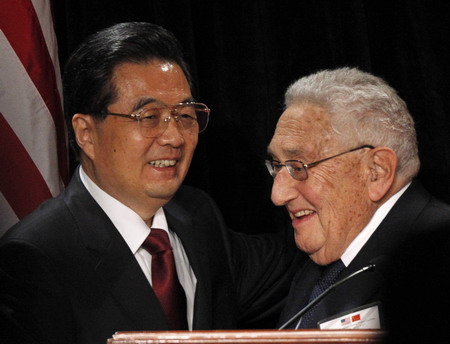US
Hu confident in bilateral relations
Updated: 2011-01-21 13:46
By Tan Yingzi and Wu Jiao (China Daily)
|
|
WASHINGTON - President Hu Jintao reaffirmed China's stance on Taiwan and Tibet questions in a speech to business leaders and foreign-relations organizations on Thursday, emphasizing that he's "fully confident" about the prospects of China-United States relations.
In the speech, held a day before he heads to Chicago, the last stop on his four-day state visit to the US, Hu also mentioned that cooperation is imperative for the development, peace and prosperity of the Asia-Pacific region, which recently has been a source of contentiousness between China and the US.
President Hu delivered the public speech to explain China's approaches to achieve a cooperative partnership with the US. Several hundred US business and political leaders attended the event, hosted by the US-China Business Council and the National Committee on United States-China Relations.
Hu proposed several steps to advance their relationship through the new decade.
He said that inexpensive but "quality" Chinese goods saved American consumers about $600 billion since 2000. He also called for more cooperation on aviation, health and the environment.
The world's economic recovery is a "tortuous process" with "many uncertainties," he said. "We should keep our relations on the path of equality."
He also urged the US to treat China with respect and as equals, stressing that Tibet and Taiwan are part of China's core interests.
China has consistently criticized international leaders or government officials when they meet the Dalai Lama. It also opposes the use of issues surrounding the Dalai Lama to interfere in Tibetan issues.
"Taiwan and Tibet-related issues concern China's sovereignty and territorial integrity," he said. "They touch upon the national sentiments of the 1.3 billion Chinese. We hope that the US will honor its commitments and work with us to preserve the hard-won progress of our relations."
Last February, US President Barack Obama met the Dalai Lama despite of China's fierce opposition. That meeting came after the US sold military weapons to Taiwan.
Hu also reassured the guests that China, which is still a developing country, will continue to "deepen reform and opening-up, advance economic, political, cultural and social restructuring and improve the socialist market economy".
He spoke broadly about military modernization, saying that China will remain committed to the path of peaceful development and strive for a peaceful international environment.
"We do not engage in arms races or pose a military threat to any country," he said. "China will never seek hegemony or pursue an expansionist policy."
Hu's state visit in Washington has been regarded by leaders and political analysts as a success.
"They can call this summit a success, not because it has solved every problem but because it has sought the way by which the problems can and will be solved," former US secretary of state Henry Kissinger said on Wednesday. "This is a great achievement and it has made us proud."
Nicholas Berry, director of The Foreign Policy Forum, told China Daily that the US has treated China as a partner.
"The state visit is staged as a celebration of China's rise - a message from Obama to both the American people and the Chinese that the United States does not consider China a 'strategic competitor', that is, a military threat. Instead, China is now a major power that the US will treat as such."
John Frisbie, president of the US-China Business Council, said: "Most simply, the visit by PRC President Hu is a reminder of the importance of the relationship - seen by many as the most important bilateral relationship for both sides in the 21st century. This is a relationship in transition, and this visit is an important part of navigating that transition. The economic and commercial relationship grows more important year by year. Our two economies are greatly interdependent, and we have common interests in each others' economic success."
Kelly Chung Dawson in New York contributed to this story.
China Daily
Specials

President Hu visits the US
President Hu Jintao is on a state visit to the US from Jan 18 to 21.

Ancient life
The discovery of the fossile of a female pterosaur nicknamed as Mrs T and her un-laid egg are shedding new light on ancient mysteries.

Economic Figures
China's GDP growth jumped 10.3 percent year-on-year in 2010, boosted by a faster-than-expected 9.8 percent expansion in the fourth quarter.
